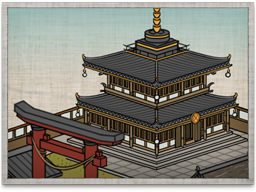Difference between revisions of "Monastery (TWS2)"
(Created page with " {{Building TWS2|image=Image:Monastery S2TW.png |Chain=Buddhist Type |Requires='''Buildings''':<li>Buddhist Temple</li>'''Arts''':<li>[[Essence o...") |
m |
||
| Line 1: | Line 1: | ||
| − | {{Building | + | {{TWS2 Building|image=[[Image:Monastery S2TW.png]] |
|Chain=Buddhist Type | |Chain=Buddhist Type | ||
|Requires='''Buildings''':<li>[[Buddhist Temple (TWS2)|Buddhist Temple]]</li>'''Arts''':<li>[[Essence of the Spirit]]</li> | |Requires='''Buildings''':<li>[[Buddhist Temple (TWS2)|Buddhist Temple]]</li>'''Arts''':<li>[[Essence of the Spirit]]</li> | ||
Revision as of 09:26, 21 December 2011
| Monastery (TWS2) | |
|---|---|
 | |
| Chain | Buddhist Type |
| Requires | Buildings: |
| Enables | Buildings: |
| Spawned Defence Forces | - |
| Basic Building Statistics | |
| Clan Effects | |
| See main article; FotS Buildings | |
Description
A man may contemplate much, including the sword's edge.
The construction of a monastery is a tangible commitment to Buddhism, and it increases the happiness of all Buddhists in a province, although Christians will feel some resentment. The monastery also helps to convert non-Buddhists to the faith. As might be expected, a monastery is a place of quiet contemplation, removed from the worries of daily life. The monks are free to reach a better understanding of Buddha and his teachings.
In the 8th century, Buddhist monasteries were subject to significant interference from the Japanese government. Regulations controlled all aspects of monastic life, and religious leaders found themselves acting as bureaucrats rather than contemplating their own spiritual development. Driven from the monasteries to escape such interference, the monks went out in the country and took the teachings of Buddha to the population as a whole. It was not long before new monasteries, free from government control, were founded. The introduction of Zen in the 12th century saw an upsurge in those seeking to retire from the world and become monks but, as Pure Land Buddhism was promulgated, monasteries went into decline. Pure Land Buddhism reduced the importance of meditation, making it less vital to withdraw from the world.